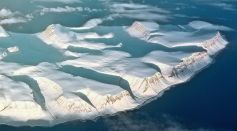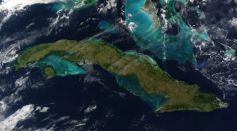Tags: Arctic Ocean
Lightning Storms Cause Sea Ice To Melt Faster on the North Pole, Study Reveals
Accelerated Arctic Ocean Meltdown: Alarming New Study Predicts Impending Ice-Free Days Within Years

World's Deepest Oceans: How Deep Are These Bodies of Water?

Arctic Ocean Becomes More Acidic Due to Melting Ice [Study]

Arctic Ocean Has Been Getting Warmer Decades Than The Records Suggest, Study Says

Warming Climate Threatens Arctic Ocean's Last Ice Area; Could Vanish by 2100 Along With Creatures That Rely on It
Researchers Complete Year-Long Expedition in the Arctic Ocean

Phytoplankton Are Causing a 'Significant Regime Shift' in the Arctic Ocean
Acidification on the Arctic Ocean Is Worse Than Expected Threatening Calcifying Organisms and the Food Chain
Icebreaker Ship To Trap Itself In Arctic Sea To Save The Planet
Ice Wedge Gives Insight into Historic Gaps of Climate Science
The Encroaching ‘Atlantification’ of the Eastern Arctic Ocean Increases the Temperature of the Water
Most Popular

Can We Bring Back Extinct Animals? How De-Extinction Science and Technology Work

Why Do Stars Explode? Supernova Formation and the Final Stage of a Star Lifecycle

The Air Pollution Climate Link: What Environmental Science Reveals About Our Changing Planet

Extreme Heatwaves Explained: What Extreme Heat Science Reveals About Our Changing Climate




